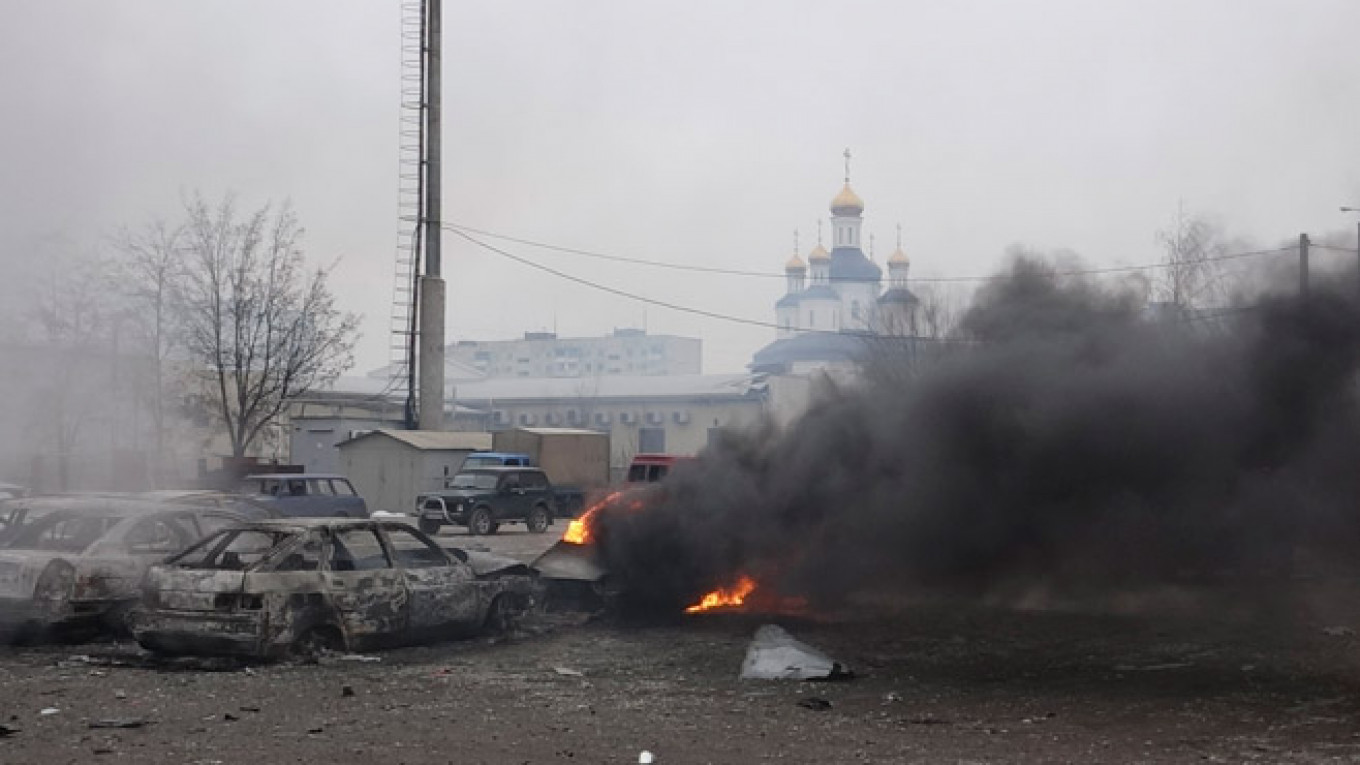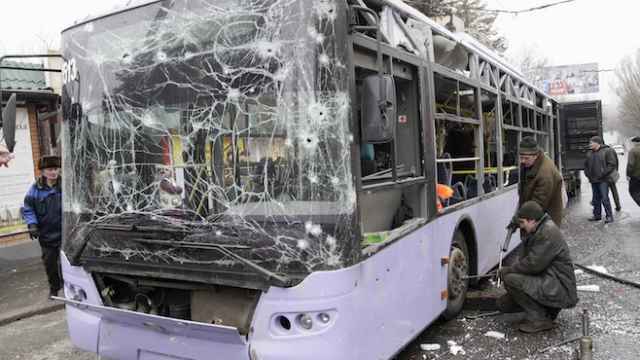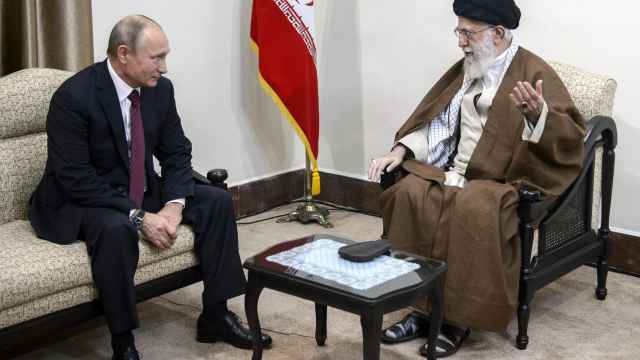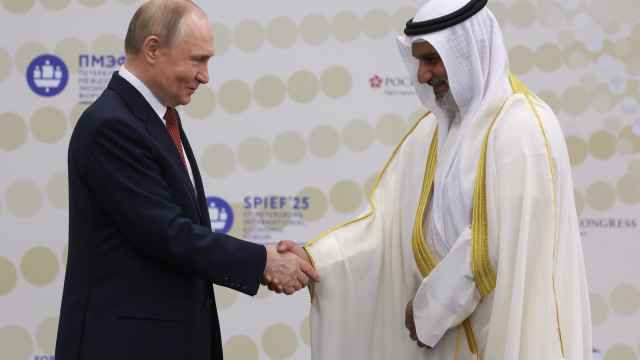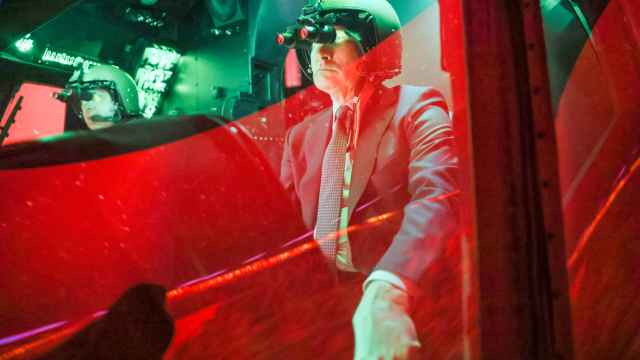As mortar fire rained down on Ukraine's turbulent east over the weekend, Russian, Ukrainian, and Western leaders demonstrated a readiness to raise the stakes in a conflict that has already claimed more than 5,000 lives.
"Only with political reform we can enforce calm in Ukraine and resolve this crisis," Foreign Minister Sergei Lavrov said during a news conference last week, signaling the Kremlin's refusal to give up on Ukraine, shy of meaningful political reform.
President Vladimir Putin has repeatedly made clear his opposition to Ukraine's potential accession to NATO, and has been a vocal advocate for the country's federalization, which would effectively grant Russia a degree of future political leverage via the Moscow-friendly regions of Luhansk and Donetsk.
Putin's dedication to this way forward for Ukraine has remained consistent. Even Western sanctions, which have dealt a substantial blow to the Russian economy, have not shaken his resolve. And a recent flare-up in hostilities in the tumultuous region attests to Putin's willingness to stay the course to the bitter end.
Donetsk's embattled airport fell to the pro-Russian rebels last week after months of vicious fighting against forces loyal to the central government in Kiev. The separatists then pushed further east in what appears to have been a bid to create a land corridor from mainland Russia to Crimea, which was annexed by Moscow last March.
Mortar fire hit a trolleybus in rebel-held Donetsk last Thursday, killing 13 by the Associated Press' count.
Alexander Zakharchenko — leader of the self-proclaimed Donetsk People's Republic — announced in the direct aftermath of the incident the launch of an offensive targeting the Donetsk region's largest port, traditionally used to ship industrial products abroad.
"Today we have launched an offensive against Mariupol. This will be the best monument to all of the victims [of the trolleybus incident]," he said at a wreath laying ceremony on Saturday, news agency RIA Novosti reported.
Zakharchenko also announced during the ceremony that he had ordered his troops to "take no prisoners," a statement that was promptly condemned by Moscow-based human rights organization Memorial as a violation of international humanitarian law, according to the organization's website.
That same day, parts of Mariupol were shelled, killing at least 30 people and injuring 83 others, according to the local city administration.
Observers on the scene from the Organization for Security and Cooperation in Europe, said that the shelling was conducted by the Grad and Uragan rockets, which they say originated from somewhere between 15 and 19 kilometers to the east of the city. The area east of Mariupol is held by rebels.
Despite his initial remarks, Zakharchenko later said that the insurgents only started to advance toward Mariupol after hearing news that the city had been shelled by what he said were Kiev-loyal forces.
Final Attempts at Negotiation
In the wake of these hostilities, President Vladimir Putin placed the blame on Kiev.
"The Kiev government has given an official order to launch large-scale combat operations along almost the entire perimeter of contact between the opposing sides," he said during a meeting with permanent members of the Security Council on Friday. "The responsibility is borne by those who issue such criminal orders."
Putin noted that he had sent a written proposal to Ukrainian President Petro Poroshenko on Jan. 15, to withdraw heavy weapons "to such a distance from which it would be impossible to fire at populated areas."
No clear answer to this proposal was received, according to Putin.
In an interview with Swiss newspaper Neue Zurcher Zeitung, Poroshenko acknowledged having received Putin's proposal, but said that Russian missile systems and artillery must first be withdrawn from Ukraine in order to implement the plan in accordance with the Sept. 19 Minsk Memorandum.
The Minsk Memorandum stipulated that heavy weaponry must be pulled back by 15 kilometers from each side of the line of contact, creating a 30-kilometer buffer zone.
When Will the Spiral of Escalation Stop?
According to Sergei Markov, a pro-Kremlin political commentator, recent events in the conflict zone reveal that the opposing sides of the conflict have not yet reached a point of willingness to conduct constructive negotiations.
"While the insurgents want to push the Ukrainian government forces away from Donetsk in order to stop shelling and restore normal life there, Poroshenko is under pressure from Kiev and the West to continue his military campaign," he said in a phone interview, apparently referencing a popular narrative among Russian officials, according to which the conflict in Ukraine is depicted as an attempt by the West to undermine Moscow's regional influence.
He also said that international sanctions against Russia will escalate further if the insurgents manage to capture Mariupol and Slovyansk, and to establish a link to Crimea via Zaporizhia.
However, if they capture Odessa and Kharkiv, Markov suspects sanctions would be lifted due to fear of a further rebel expansion. "Ukraine would become a federal and democratic state in exchange for keeping Kiev [out of rebel hands]," he wrote via Facebook.
Following the events in Mariupol, U.S. President Barack Obama said that the United States will consider any option short of military action to rein Moscow in as far as Ukraine is concerned, Reuters reported on Sunday.
"It would not be effective to engage in a military conflict with Russia," he added.
Russian Foreign Minister Sergei Lavrov told U.S. Secretary of State John Kerry on the phone on Sunday that "Russia is ready to do everything in its power to encourage parties toward a peaceful solution," according to a statement on the ministry's website.
According to Pavel Zolotarev, deputy director of the Russian Academy of Sciences' Institute of the United States and Canada, Kiev's military ambitions have been reinforced by U.S. statements, but Poroshenko understands that the situation can only be resolved by diplomatic means.
"The difficulty is that the stakes are only getting higher and higher, which means that the eventual costs will be high as well," he told The Moscow Times in a phone interview.
Contact the author at [email protected]
A Message from The Moscow Times:
Dear readers,
We are facing unprecedented challenges. Russia's Prosecutor General's Office has designated The Moscow Times as an "undesirable" organization, criminalizing our work and putting our staff at risk of prosecution. This follows our earlier unjust labeling as a "foreign agent."
These actions are direct attempts to silence independent journalism in Russia. The authorities claim our work "discredits the decisions of the Russian leadership." We see things differently: we strive to provide accurate, unbiased reporting on Russia.
We, the journalists of The Moscow Times, refuse to be silenced. But to continue our work, we need your help.
Your support, no matter how small, makes a world of difference. If you can, please support us monthly starting from just $2. It's quick to set up, and every contribution makes a significant impact.
By supporting The Moscow Times, you're defending open, independent journalism in the face of repression. Thank you for standing with us.
Remind me later.


